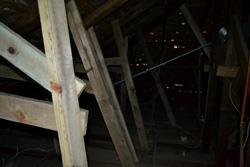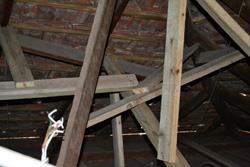South African home buyers are urged to conduct a home inspection before signing the property sale agreement, according to Eric Bell of Inspect-A-Home.

Bell says historically, sellers will not disclose all defects and therefore it is much better for the buyer to have the inspection done prior to any sales agreement in order to have a fair assessment of the property to avoid any costly oversights. Most houses inspected do have defects and if costly to repair, a reduction in the purchase price is only fair.
Property24 recently published an article on why it is important to hire a property inspector. Read the article here.
In the article, Bell explained how a couple ended up paying R150 000 over and above the purchase price of their new home.
What they didn’t know when they signed the sales agreement was that they would need to replace the roof sheeting, rotten door frames, and a leaking geyser before they moved in.
They signed a disclosure document stating that the house was in good working order, so they couldn’t return to the seller or estate agent with their complaints or bills, he said at the time.
In response to the article, a Property24 reader had this to say:
“Great, but what about when you invest in the services of an inspector and he/she highlights all the property's problems and you do not end up purchasing it - surely the seller needs to disclose all the defects that the Inspector found? But this is never the case.
The seller should have this completed upfront, not the buyer, just as they do with a electrical certificate.”
Bell has the following answer:
Bell says historically, sellers will not disclose all defects and therefore it is much better for the buyer to have the inspection done prior to any sales agreement in order to have a fair assessment of the property to avoid any costly oversights.
Most houses inspected do have defects and if costly to repair, a reduction in the purchase price is only fair.
Buyers are mainly looking for peace of mind, and at the end of the day the majority of houses inspected are still sold, he says.
Another reader asked if anyone knew of accredited home inspectors and what makes them accredited?
In his response, Bell says Inspect-A-Home belongs to the South African Society of Home Inspectors (SASHI) as well as InterNACHI (National Association of Certified Home Inspectors) and has conducted quality reports for the past 28 years.
What prompted the article in the first place?
This is the letter sent by Bell to Property24.com:
We were contacted on Friday 18 May by a client who had just purchased a house in Durban for R2.2 million and needed Inspect-A-Home’s assistance as he had very serious roof problems.
No disclosure was made by the seller to the RE/MAX agent or the buyer that there had been problems with the roof and only after moving in did he find out that he had a serious problem with his roof.

This house in Durban needs to have the roof completely removed and new trusses, underlay and battens, etc. installed as well as re-installing roof tiles at a cost of R95 000.
You can see that all the very new South African pine timber (with new shiny screws) had been installed to try and prop up the failing roof.
This is a classic case of Latent Defects, as it was hidden in the roof cavity and not easily seen.
Maybe Attorneys who believe that the Consumer Protection Act (CPA) does not cover property transactions should reconsider their stance as we have many examples of properties being sold with similar problems.
Maybe they need to ask who is protecting the buyer or consumer.
They should examine these photos of a house where the buyer has had to move out after only three weeks because of non-disclosure.
Perhaps if they themselves experienced similar problems when buying their new property then they may change their minds as we are sure that they would not like to be in a similar predicament.
Had the seller been honest about the problems before concluding the deal, this unnecessary situation could have been circumvented.
If the current practice of hiding behind disclosure documents or using the Voetstoots clause by estate agents and attorneys continues unchecked then the consumer is totally unprotected and the CPA absolutely non-effective.
Attorneys make substantial amounts of money from conveyancing fees and basically they are ensuring their own interests by protecting the agents.
Is this ethical? Innocent homebuyers trust these people and this trust is totally misplaced in our opinion.
When I visited the house the next day I found that the roof was in a seriously bad condition and was in danger of collapsing before all these temporary props were installed.
The house has subsequently been inspected by a roofing specialist and the ITC roofing engineer has condemned the roof.
The photographs show how bad the roof really is, but it is much worse when it is viewed from within.
The estimated cost of replacement will be over R430 000.
Unfortunately all the roof timbers are old and damaged by wood borer and the entire roof, ceilings, electrics, house alarm and plumbing will need to be removed.

The buyer of this home in Durban will need R433 000 to repair damange to the property he moved into in March.
We have obtained independent quotes from specialist contractors for the roofing, electrical, plumbing, etc. The clients, not having alternative accommodation, will probably have to stay in a hotel while their house is being repaired.
Herewith the total breakdown of the costs:
1. Remove roof completely and install new trusses, underlay and battens, etc. and re-install roof tiles - R95 000
2. Install new ceilings/cornices – R55 000
3. Install new electrics and lighting – R35 000
4. Install new plumbing and re-install geyser – R35 000
5. Furniture removal and storage (2 months) and redelivery – R25 000
6. Hotel accommodation for 2 months – R100 000
7. Repaint house internally and externally – R63 000
8. Probable damage to laminate floors, sanitaryware, built-in cupboards, kitchen units (estimate) is R25 000 - and this bring the total to R433 000.
In an email sent to Bell by the property buyer, he says they moved into the new property on 30 March 2012 and needed to fix leaking gutters.
Upon using the services of a gutter specialist, they were told the roof was wavy and looked unsafe.
When the new homeowner called a roofing contractor to look at the property, they were told the roof was very unsafe and they needed to vacate the property immediately as the roof could collapse.
The new home owner states in the email that after contacting RE/MAX, they were told there was nothing the agency could do as they (new homeowners) had seven days to inspect everything in the property.

The agent, if clever enough to realise that all blame will come his or her way, will upfront, make sure that the seller signs a defect list.
The agency also told them to take the matter up with the previous owner, although doubting anything could be done.
The story continues – facts were not entirely correct
After the article Reasons to hire a property inspector was published on Property24.com on 22 May, Bell sent another email to Property24 on 25 May, which revealed the details above of the collapsing roof of a property located on Nelson Road in Overport, Durban in KwaZulu-Natal.
In his email, Bell says the buyer has serious defects in the property roof as described above and depicted by attached pictures.
He says unfortunately the information supplied to him by the buyer last weekend was not entirely correct.
When asked about having the house inspected, the agent said that he had 7 days in which to do it after signing the offer to purchase and not after he moved in as he (Bell) originally wrote in the article published on 22 May.
“I discovered afterwards that this was actually written on the sales agreement under special conditions.”
However, the seller was never available to meet during the day and the buyer was told by the agent that the seller was prepared to accept another offer if he insisted on an inspection.
The buyer instead took a friend along (who was a builder), but due to the short time they had on site, did not get into the roof.
“I wish to apologise to RE/MAX for any inconvenience or embarrassment this may have caused and assure them that the mistake was not intentional and was merely a lack of understanding of what had transpired at the time of the sale,” says Bell.
He points out that this does not take away the seriousness of the situation as it is clearly obvious that the seller put this house on the market knowing full well that the roof was in danger of collapsing and had made temporary repairs, which were non-compliant and constitute latent defects.
He says this is fraud and has had a rebound effect on the estate agency concerned as they apparently were not aware of the defects prior to the sale.

What a pleasure it would be to have a home inspection certificate done on each property we sell. This kind of thinking is a dream and will never happen unless they make it law as in the UK where they introduced Home Information Packs."
The seller will now be held accountable and legal action will be taken against him, but the litigation will probably take many months and will be very costly initially for the buyer.
Had the house been professionally inspected this unfortunate situation would never have occurred, he points out.
Word from estate agent
Linda Erasmus, chief executive officer of Fine & Country SA says in real estate, a number of players and factors are involved.
Erasmus notes that making a sale and leaving behind a seller who is “chuffed” with the price and a buyer who is equally “over the moon” with his new house takes some doing.
In this example, she says the estate agents get 7.5 percent commission on the deal and the only two people quivering about life being unfair is the attorney because the estate agent was paid more than him and the home inspection people due to the fact that they were not even called upon for an opinion.
(That is in a perfect world)
In the not so perfect world, we can add to the number of people offering services who all form part of that one process.
“The real issue is how to get all those service players working together on one deal, without blaming each other,” says Erasmus.
She explains that it is all too common in South Africa that when it comes to building a house, the plumbers and the builders and the kitchen people, all build a house (also with a few disagreements), but far less than the service providers on one property transaction.
Most of the time some of the players involved in the sale, only understand their bit and fail to see the big picture.
It is like watching a soccer game and only has a view of the wing running with the ball and never sees how a score is made.
Once all the activities are understood, everyone’s energy flows in the right direction and the process proceeds, she says.
Erasmus’s take on the blame game:
The Seller
Sellers who hide defaults can only blame themselves if the deal becomes complicated.
However, we sell so many well-groomed homes of people who are absolutely caring for their property, that it will be unfair to make a general rule by warning all buyers against sellers.

The attorney is landed quite often with a contract where clauses conflict with each other. This comes as a result of the process of negotiation – the seller wants X (so this is inserted in the contract), the buyer wants Y (so this is also inserted in the contract). So the seller sees X and is happy and the buyer sees Y and the buyer is happy, but then the X and Y conflicts in a legal agreement.
The Buyer
The buyer of any product in South Africa has a right to inspect.
In most sales, the buyer is negotiating the price down and wants the seller to fix and repair, and most buyers want their bread buttered on both sides.
These buyers want a lower price tag and once they have got the property at a well-reduced price, they still want to hold the seller liable for everything that goes wrong.
Pay the price and also demand a well-designed, modern home where everything opens and closes automatically.
My view is that buyers should also be realistic when buying second hand properties
The estate agent
The agent, if clever enough to realise that all blame will come his or her way, will upfront, make sure that the seller signs a defect list.
We have used this successfully for many years and solved many a potential problem as the seller is the only one that has lived in the house and will be the only one who would be genuinely able to give that information.
Most important – the estate agent is the conductor on the stage and must inform the clients of their rights, responsibilities and consequences.
One cannot leave behind to say that most estate agents fulfil this obligation, 80 percent of sellers ignore their plea.
The Attorney
Conveyancing attorneys in South Africa need to be applauded.
While estate agents are sales people, I will openly state that a small percentage of them understand the law well enough to educate their (unteachable) clients about contracts.
The attorney is landed quite often with a contract where clauses conflict with each other.
This comes as a result of the process of negotiation – the seller wants X (so this is inserted in the contract), the buyer wants Y (so this is also inserted in the contract).
So the seller sees X and is happy and the buyer sees Y and the buyer is happy, but then the X and Y conflicts in a legal agreement.

The buyer of any product in South Africa has a right to inspect. In most sales, the buyer is negotiating the price down and wants the seller to fix and repair and most buyers want their bread buttered on both sides.
The Home Inspector
What a pleasure it would be to have a home inspection certificate done on each property we sell.
This kind of thinking is a dream and will never happen unless they make it law as in the UK where they introduced Home Information Packs.
This legislation kept everyone busy for three years – in fact, it created a new stream of business for home fixers and inspectors.
However, after three years the powers in control realised that the scales of economy did not tip over.
Sellers suddenly faced a huge lay-out to sell their house before putting it on the market – meaning cash out of their pocket that they did not have.
I would go as far as to say that sellers, who want to stage their home for a sale and do have the money to do so, will probably have few defects in their home.
The seller who desperately wants to sell, does not have another R500 000 to fix his home, but yes he can drop the price to get some money in.
Erasmus adds that every service provider has his/her place, but that place does not find application in every single transaction - it all depends on the personal circumstances from each individual seller.








